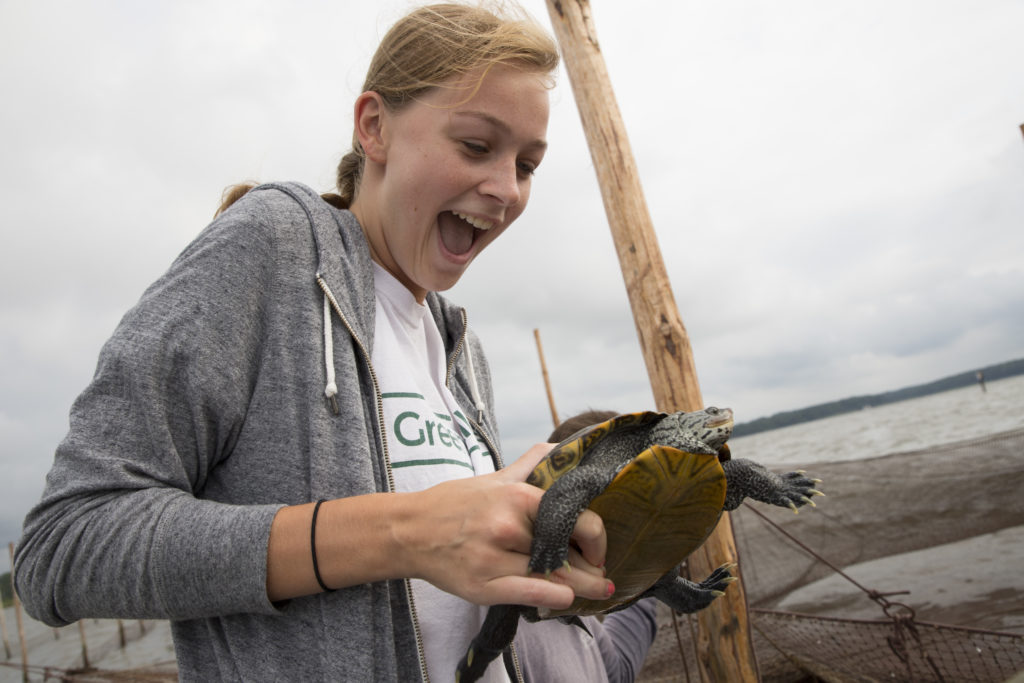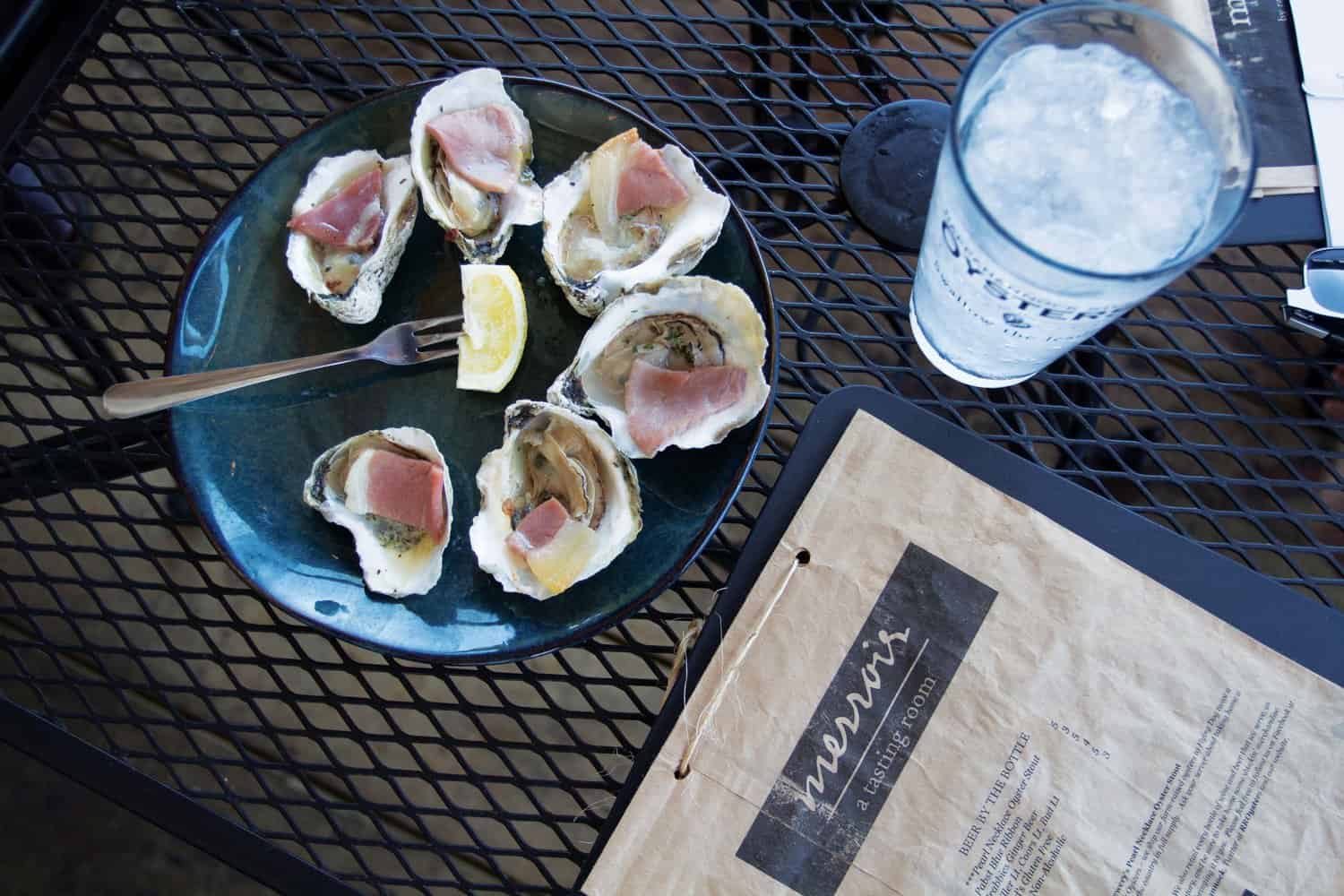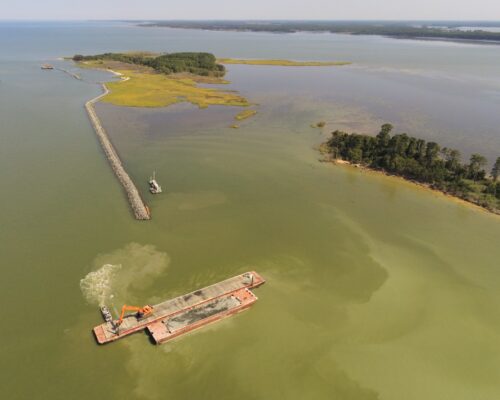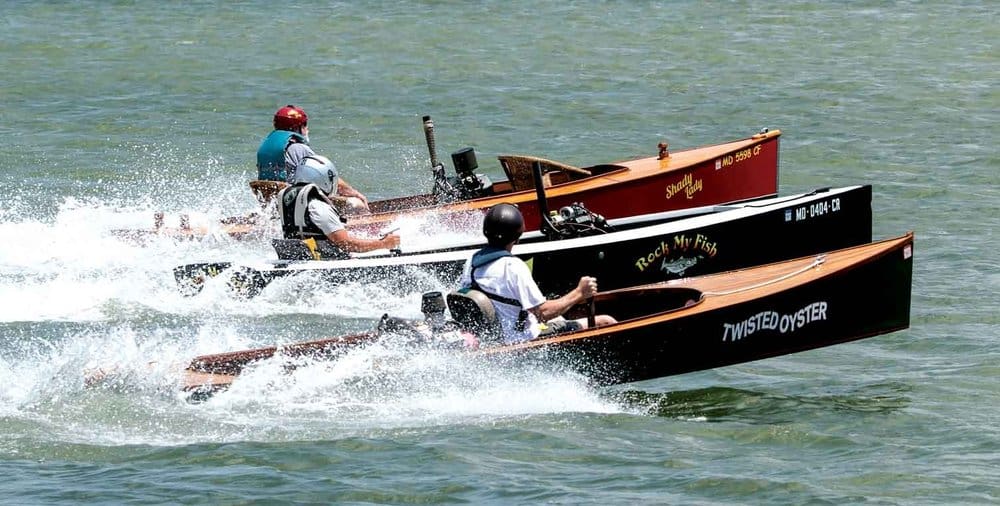Exploring the Bay with Washington College’s Chesapeake Semester
As the ferry from Crisfield pulls up to the dock in Ewell on Smith Island, the passengers onboard are disoriented. Though the pilings are visible, the dock itself is not. Due to a seasonal surge called a king tide, it’s under two feet of water. We look at each other, shrug, and start to take off our shoes and roll up our pant legs. Luggage and backpacks are passed over to a waiting canoe, and we tow our gear behind us as we slog inland, barefooted, through the unusually high tide. It’s a Venetian-style welcome, and certainly one that might deter less hardy souls. But for the students and professors of the Chesapeake Semester wading past the sandbagged Methodist Church, it’s just another learning experience—a remarkable, yet regular, day in our Chesapeake classroom.
Most Chesapeake educational programs are designed to be environmental sparks—illuminating one-time trips or experiences that expand on classroom studies with marsh explorations, seine net samples, and a sail, cruise, or a paddle. By contrast, Washington College’s Chesapeake Semester is a long,
slow burn.
Over the course of a full college semester, students dedicate their entire 16-credit course load to this multidisciplinary program. They commit to what is essentially a study-abroad program for the Chesapeake, sacrificing sports, parties, and traditional on-campus life. Their schedule alternates between two weeks of classroom studies in Chesapeake history, culture, environmental science, biology, and the arts and then two weeks in the field, applying what they’ve learned. Over four of these fieldwork “journeys,” guided by Washington College professors (including yours truly), students explore the tributaries of the watershed. Throughout the semester, students visit working maritime communities, environmental scientists and advocates, historic sites, archaeologists and anthropologists, farms, forests, and fishermen—all to gain a nuanced understanding of the challenges confronting the Chesapeake and coastal communities around the world.
On Smith Island, for example, the Chesapeake Semester students paddle out across North End Bottom to Martin National Wildlife Refuge, where they seine the shallows and collect water and soil samples. They meet with waterman Mark Kitching at his crab-shedding operation to discuss the crabbing industry, regulations, and the challenges of surviving storms and high tides on Smith. At sunset, they wade out on the submerged road towards Rhodes Point to take photographs for a photo essay assignment. The next day, for a few hours, the students stop by the cultural center, the restaurant, the church, and an artist’s collective shop, chatting with islanders to develop a more intimate understanding of island rhythms, values, and community. During this visit, many of them will also try a fried soft-shelled crab for the first time.
It’s a wonderfully unorthodox approach to college teaching, designed to help students go beyond the classroom’s conceptual mindset to the nuances of the real world. “I want students to be open minded, think critically, and ask questions,” says Dr. John Seidel, director of the Center for the Environment and Society (CES) that runs Chesapeake Semester. “Students who have taken the Chesapeake Semester say it changed their lives. They think differently, they are willing to speak out, they get comfortable with the idea that questions may not have a ‘right’ answer. Through Chesapeake Semester, students have a sense that there are obligations toward their human community and the natural community. Because of the experiences they’ve had, they are well-placed to make a difference.”
The inspiration for the Chesapeake Semester came from two places: a similar maritime program run by Mystic Seaport and Williams College, and the fundamental belief that the richest experiences happen outside of the classroom. Seidel aimed to greatly expand on the Mystic footprint of maritime history and on-the-water programs by adding rigorous humanities coursework, first-person field encounters, and hands-on experiences. For Seidel, the possibilities seem endless. “Really, how could you find a better laboratory than the Chesapeake Bay?” Seidel says. “It introduces a level of political, social, and environmental complexity that is difficult to find anywhere else in the whole world. Literally outside our back door.”
Today, Chesapeake Semester stands as a national model for experiential, interdisciplinary college learning. Since 2009, over 130 students have participated in the innovative program. Graduating with varied majors from psychology and business to environmental science and education, Chesapeake Semester alumni use their real-world experiences, connections with diverse Chesapeake people, and environmental and societal questions posed by the program to enhance their understanding of the larger world.
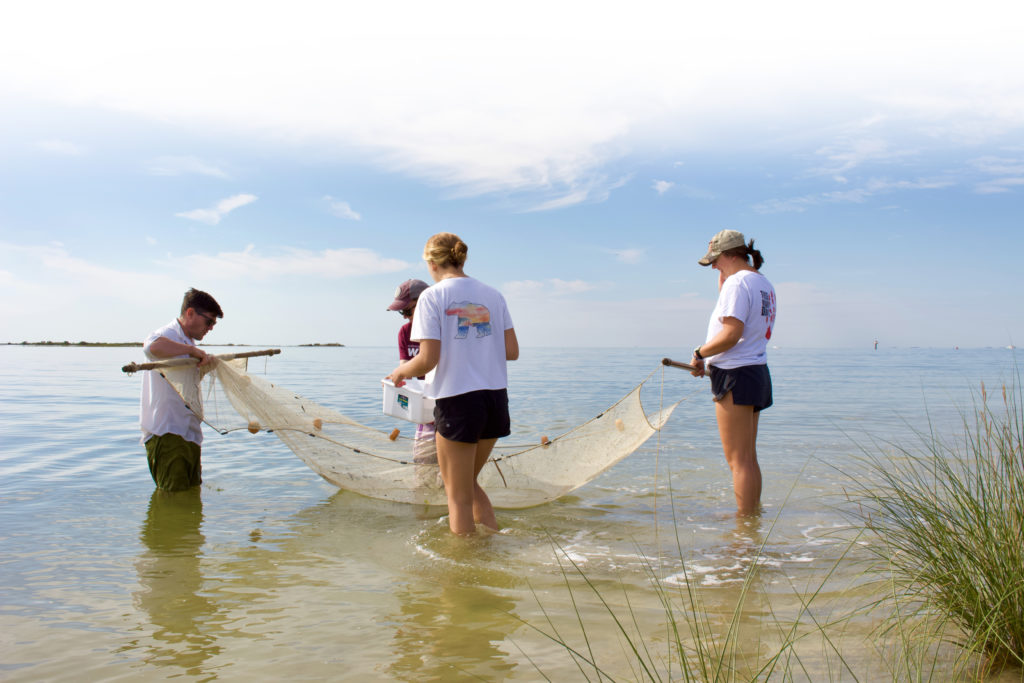
The challenges of Chesapeake Semester—meeting Bay stakeholders across the political and environmental spectrum, foraging and sleeping in a tidewater woods, paddling the Susquehanna and exploring the Conowingo Dam, hiking in the jungle during a comparison study trip to Belize—have shaped the futures of the students who have participated in the program. Graduates have found internships or careers with NOAA, the Chesapeake Bay Foundation, the Wyoming Fish and Game Department, the Chesapeake Bay Environmental Center, the University of Maryland’s Horn Point Lab, and the Chesapeake Bay Maritime Museum.
Many, like Elle Bassett, a 2010 Chesapeake Semester alumna and 2012 Washington College graduate, have leveraged their skills through leadership roles within Chesapeake organizations. For Bassett, the Miles-Wye Riverkeeper for ShoreRivers, the benefit of the program is clear: “Every job I’ve gotten since the Chesapeake Semester was because of the Chesapeake Semester.”
Bassett found the hands-on aspects of the program refreshing and transformative. Where else would you be foraging for Native American-inspired dinner (muskrat baked in coals, mushrooms prepared in a pumpkin) for college credit? For Bassett, those moments were not just memorable but the foundation of a career. “For my work life, pretty much all aspects of everything I learned in Chesapeake Semester I use daily in my career. There’s no component I haven’t touched now as a Riverkeeper that we didn’t talk about in the Chesapeake Semester.”
Fellow Chesapeake Semester alumna Kellie Rogers-Fiala agrees. Rogers-Fiala is the Philip Merrill Environmental Education Program Manager for the Chesapeake Bay Foundation, and she credits the program’s critical-thinking skills as a primary influence in her approach to teaching. “I look back, less on specific experiences, but [on] the feelings I got when I was able to be curious and ask questions, and how much more valuable it was to take a student-driven approach to learn about the Chesapeake Bay. It transformed my own approach to teaching. It also really helped me fall in love even more with the Bay, and inspired me to keep learning more about it.”
Importantly, Chesapeake Semester’s emphasis on understanding multiple environmental perspectives also left a lasting impression. “The Chesapeake Semester did a really good job of showing me that there are a lot more people at the environmental table than just environmentalists,” Bassett says. “It opened my eyes to how many different types of people need to be in the conversation as we discuss Chesapeake Bay issues. That sort of complexity is not something I think I would have gained from a course that was just in the classroom.”
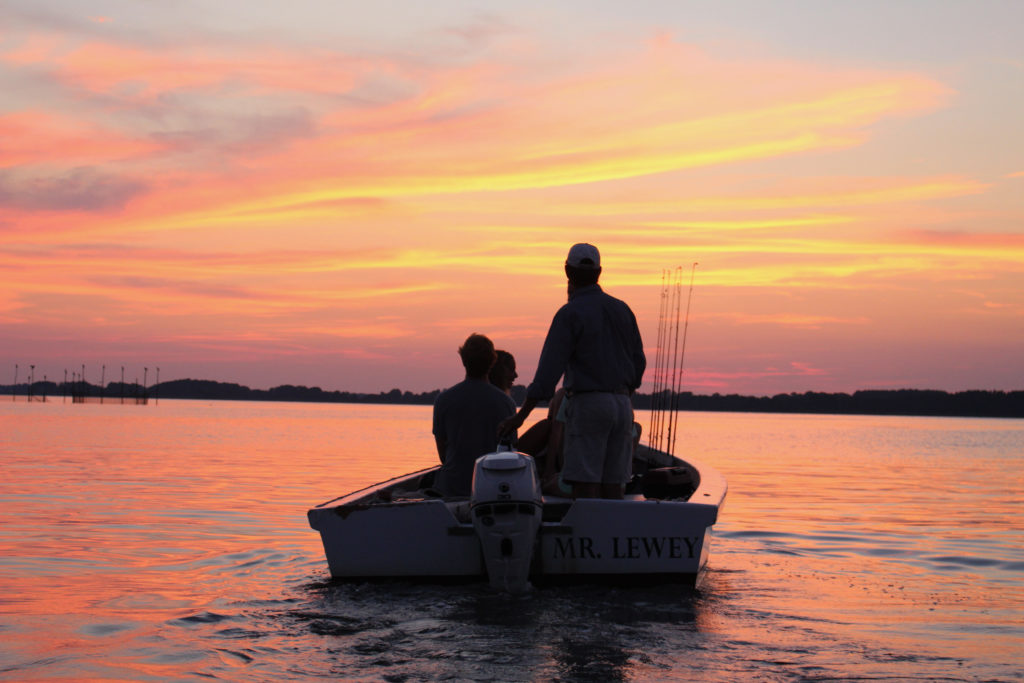
For Bassett, Rogers-Fiala, and the many other graduates of the Chesapeake Semester, the program created a direct, practical path from their experiences as students in the Bay’s brackish ‘classroom’ to professionals shaping the future of Chesapeake science, education, policy, and fisheries. It also built life skills essential to stewardship of the Chesapeake’s environment and heritage: passion, empathy, and the ability to listen and build consensus.
“The reason that we’re doing the work is not just for the ecosystem—
so many other things depend on it,” Bassett says. “As Riverkeeper, I have to connect with people and help them build their relationship with their environment. Listening to what they value and leaning into what makes the river meaningful to them, whether they’re on a family trip to St. Michaels or they’re crabbing on the Wye for their livelihood … I have those kinds of conversations every day. And that’s exactly what Chesapeake Semester did such a great job of teaching.”

